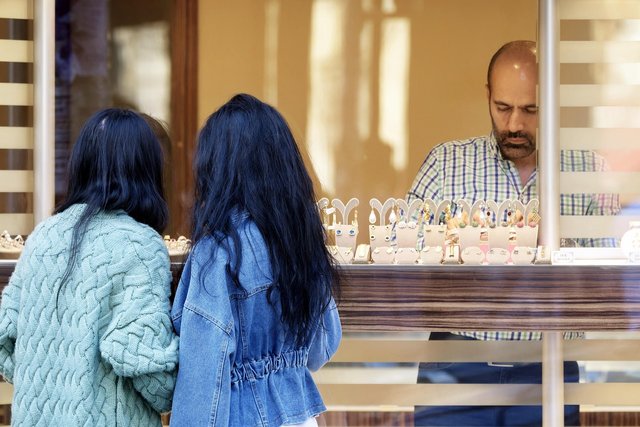Shopkeeper & Customer
A good bargain is like a victory, satisfying and uplifting. It can make your day or brighten your whole week. For some people, it feels good every time they use the item. I would feel much better when I told my siblings how good the deal was.
At the hardware shop
Customer: "I love this laptop, but the price is a bit steep. Can you throw in some extras?"
Salesperson (smiling): "What kind of extras are you thinking of? We do have a promotion on accessories."
Customer (negotiating): "How about a free keyboard and mouse? That would sweeten the deal."
Salesperson (considering): "I can offer you a discount on the accessories bundle. Let me see what I can do."
Customer (persistent): "If I also buy an external drive, can you give me a better deal on the bundle?"
Salesperson (smiling): "You're a savvy shopper! Alright, I can give you 20% off the bundle with the purchase of an additional external drive."
The customer and salesperson will always reach a mutually beneficial agreement, and a sale is made. The conversation showcases the art of negotiation and finding real close to a mutually beneficial price.
| 1. Have you ever successfully bargained your way to a great deal? What worked for you persistence, politeness, or a little humor? |
|---|
Being friendly with a touch of humour often worked, but I have noticed that bargaining in the Salesperson's language creates better results. Most of the market women and Salespeople communicate using Nigerian pidgin English, trying to get a good deal with textbook English will almost always fail. The shopkeeper usually feels pushed to the wall, uncomfortable and quickly wants to send you off. Using pidgin English makes them comfortable and playful.
| 2. Do you believe it's fair to negotiate prices in local or small shops? Where do we draw the line between saving money and respecting hard work? |
|---|
We have a very lax price control and as such, shops sell the same goods at different prices. In the market, we have the normal market price and a special higher price for men who go to the market by themselves. Apart from supermarkets where prices are attached to the items, we have to negotiate a good price. Women are generally good at negotiating a good bargain.
When negotiating the services of an artisan, I try not to devalue the artistic value of their services. I prefer when my husband handles such negotiations so I don't do it often.
| 3. What is your strategy when you ask for a discount? Are you more of a sweet talker, a quiet smiler, or a straight talker? |
|---|
Assuming there are A, B, and C in the shop, and I am interested in A. I pick up C and bargain for it. When all the attention is on item C, I casually ask for the price of item A. Often, I get the exact price or something close to it. With a little humorous push and pull, we settle quickly and I buy.
Then the shopkeeper will often ask, "What about item C? Don't you need it anymore?"
Maintaining a really friendly and humorous conversation in the right language has always proved helpful
| 4. What is the most unexpected or hilarious response you have ever heard from a shopkeeper? Some replies stay with us forever share your funniest memory! |
|---|
Once I bargained so low that the shopkeeper told me he was going to remove the item from the pack and sell only the pack at the amount I proposed to buy the item.
I will never forget that response; it was cutting and hilarious. That was his way of telling me that my offer was too low, it could only buy the pack without the item inside it.
| 5. In a pricing debate, who do you usually support the customer looking for value or the shopkeeper trying to survive? Why do you lean that way? Personal experience or principle? |
|---|
The shopkeeper always tries to keep the price up and make some profit while the customer tries to bring it down and have a good bargain.
When it's time to buy, I sympathise with the customer and when I am selling, my sympathy switches to the shopkeeper.
I choose to lean that way because I want to get the best out of the shopping experience.
Special invitation to @okere-blessing, @bela90 and @josepha



Greetings.
It's fascinating how you've broken down the dynamics of negotiation in our local market. It's clear you've got a keen eye for the social nuances involved. Your observation about the effectiveness of using pidgin English is spot on, because if you go use plain English, them go take as Ajebo. It's amazing how language can create a sense of comfort and playfulness, leading to better results.
You've also highlighted the importance of understanding the different pricing structures in the market, and how women are often adept at securing good deals. I can imagine that navigating the complexities of price negotiation takes a lot of skill and finesse. It's admirable that you choose to appreciate the artistry involved when dealing with artisans, and that you trust your husband to handle those negotiations.
Your insights offer a glimpse into the vibrant and dynamic world of our local market, and I'm impressed by our ability to navigate its intricacies.
Downvoting a post can decrease pending rewards and make it less visible. Common reasons:
Submit
Honestly if you want to succeed when bargaining price in local market, one must let go of polish and standard english and speak broken or english and other indigenous languages if any. Understanding the how things are priced in different market and culture are really important as it will help the buyer get the best out of his or her purchase. Thank you for visiting my blog.
Downvoting a post can decrease pending rewards and make it less visible. Common reasons:
Submit
Curated by @ okere-blessing
Downvoting a post can decrease pending rewards and make it less visible. Common reasons:
Submit
Una discusión creativa y adaptada a la vida real en la situación ejemplificada, certeros argumentos amiga. Exitos en tu estupenda entrada.
Downvoting a post can decrease pending rewards and make it less visible. Common reasons:
Submit
Thank you dear friend for visiting my blog
Downvoting a post can decrease pending rewards and make it less visible. Common reasons:
Submit
What an interesting conversation, I can agree with you on the use of language on the salesperson, hahahaha I can remember when I was a coper I went into one shop to buy something and I was speaking polished English the next thing I heard was Nma ikombakara hahahaha I realized the meaning afterwards and I changed to speaking small English. I have learned one bargaining strategy from you thanks for teaching us through this post.
Downvoting a post can decrease pending rewards and make it less visible. Common reasons:
Submit
My dear too much grammar when bargaining prices will end buying in a higher prices because they will believe they are selling for one rich man or woman.
Thanks for visiting my blog.
Downvoting a post can decrease pending rewards and make it less visible. Common reasons:
Submit
Haha, I really enjoyed reading this. Bargaining is definitely an art, and I totally agree that a friendly attitude and speaking the seller’s language can make a huge difference.
That "just sell the pack" line had me laughing some shopkeepers really know how to clap back with style.Thanks for sharing such a fun and relatable experience.😁🌼🌸
Downvoting a post can decrease pending rewards and make it less visible. Common reasons:
Submit
Hi @ udyliciouz,
good job
Thank you for posting in our commnunity…..
Vote @pennsif.witness for growth across the Steemit platform through robust communication at all levels and targeted high-yield developments with the resources available. Vote here
Downvoting a post can decrease pending rewards and make it less visible. Common reasons:
Submit
Hello, please I want to notify the team members that my post has not been verified by the team since yesterday.
@ruthjoe
@fannyescobar
@tammanna
@vishwara
@alexanderpeac
Thank you for your understanding
Downvoting a post can decrease pending rewards and make it less visible. Common reasons:
Submit